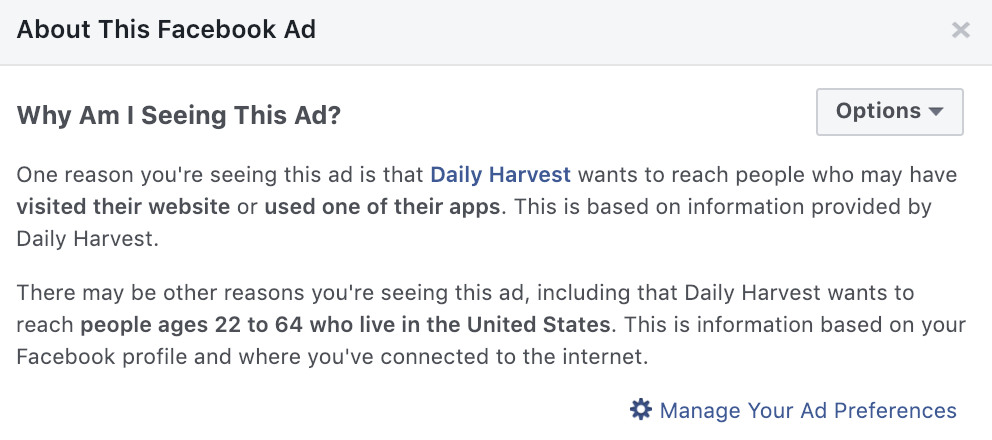Subscribe now and get the latest podcast releases delivered straight to your inbox.
Facebook Expands "Why Am I Seeing This Ad" Feature to Provide More Detailed Insights to Users

By Iris Hearn
Jul 15, 2019

Following a slew of data collection and privacy scandals, Facebook has made several moves to increase ad transparency for its users.
Its main goal is to help Facebook users understand how their information is being collected by brands and what data is used to display ads.
In 2014, Facebook introduced the “Why Am I Seeing This Ad?" feature to educate its users to make more informed decisions on the third-party apps that access Facebook account data.
The platform made updates to the tool earlier this year that provided even more context into ad targeting. However, since the updates launched, Facebook received feedback that the tool was difficult to navigate and didn’t always provide clarity on how advertisers received user information.
As a result, Facebook rolled out two new changes to the tool to enhance transparency. These updates are currently live for all users.
Access more detailed ad targeting insights
While the “Why Am I Seeing This Ad” feature provided information on why you could be targeted, users wanted to know more.
Previously, the tool only showed one or two of the most relevant reasons why you were selected for the ad, like basic demographic information — but that didn’t always tell the whole story.
For example, a common result might say that the advertiser is “trying to reach people over the age of 18 that live in the United States.” While this does provide information, it’s not enough to truly know why this advertiser was targeting your account specifically, or how they got your information.
Now, Facebook has updated this feature to provide more detailed information to help you understand why an ad was targeted to you.
Users can view the interests or categories the advertiser used that matched you with with a specific ad, and also understand where that targeting information came from (i.e., based on websites you’ve visited, apps you’ve downloaded, pages you’ve liked, etc).
So today, when I got an ad for Daily Harvest, I saw the following reasons why I was targeted:

Beyond just being in the target age group and location, I can also see that because I’ve previously visited the Daily Harvest website and given them my email, Daily Harvest provided that information to Facebook and used it to target ads directly to me. This provides much clearer insights for users.
Additionally, the ad insights now highlights controls you can use to adjust your ad experience if you want to change how advertisers target you.
Here’s a short video Facebook provided with a demo of this feature and the information it provides.
Added transparency regarding businesses that upload lists with your information
Businesses can also target users by uploading a list containing information that can be linked back to your Facebook account, like an email address or phone number.
To help users understand which businesses are uploading lists with their information, Facebook updates its Ad Preferences page (located within User Settings) to include two new sections.
The first displays any advertisers that uploaded lists with your information to Facebook and have advertised to your account with it. This section does not show all historical data, just any of these advertisers that have used a custom list to target at least one ad to you in the past seven days.
This approach can actually be more helpful than displaying an entire history of targeted ads because users can see what brands are currently using their data for advertising.
For example, maybe you gave your email address to Old Navy in 2013, haven’t used the site since, and see they’re still using it to target ads to you. That would be helpful for you to know so you can indicate you no longer want to see these ads in the future.
Additionally, Facebook added a section showing businesses that upload lists with your information and shared it with another third party. This can happen in cases of brand partnerships that can access data from one another. Now you can understand how these third party companies are able to access your information.
In this section, you can see why the business that uploaded your list was allowed to share your information and any advertiser that used the shared list to serve you an ad in the last 90 days.
Again, Facebook provided a short video showing how this feature works:
This provides an additional layer of transparency into ad targeting and better explains how brands you’re unfamiliar with are able to access your information.
Why ad transparency is so important
Most people in the digital marketing industry have a pretty solid understanding on why ads are targeted to us — but for others, it’s not so clear.
For example, a lot of my non-marketer friends are truly convinced that Facebook is tapping into their phones to listen to what they’re talking about.
Rational or not, this fear can cause people to lose trust in Facebook as a platform, which in turn, can reduce advertisers’ reach.
However, with tools like these, it’s easy for people to see how the system selected them for a specific ad, and how the business got their information in the first place.
By providing a way to opt out of certain ads after seeing you’re being targeted, Facebook creates a better experience for its users.
Additionally, this benefits marketers by helping scale down your audience by omitting those who aren’t interested. Allowing users to basically raise their hand and say “I’m not interested in this,” marketers can ensure that the impressions, clicks, and engagement metrics are not skewed by displaying ads to people who will never become customers.
For so long, marketing and advertising has gotten the reputation for “manipulating” people to buy things they don’t need. With a peek behind the curtain, consumers can have more insight into these practices and realize it’s not as “dark” as they may have thought. This clarity can reduce the friction in seeing ads, making it a more cohesive, trusted experience between brands and consumers.


Order Your Copy of Marcus Sheridan's New Book — Endless Customers!